From left: Paula Gilmore, CEO Parkinson’s Association; Prof George Kerohan, Ulster University; Prof Tony O’Brien, Consultant Physician in Palliative Medicine; Dr Sean O’Sullivan, Consultant Neurologist; Dr Suzanne Timmons, Consultant Geriatrician.
Previous Research
Launch of Palliative Care in People with Parkinson’s Disease Guidelines
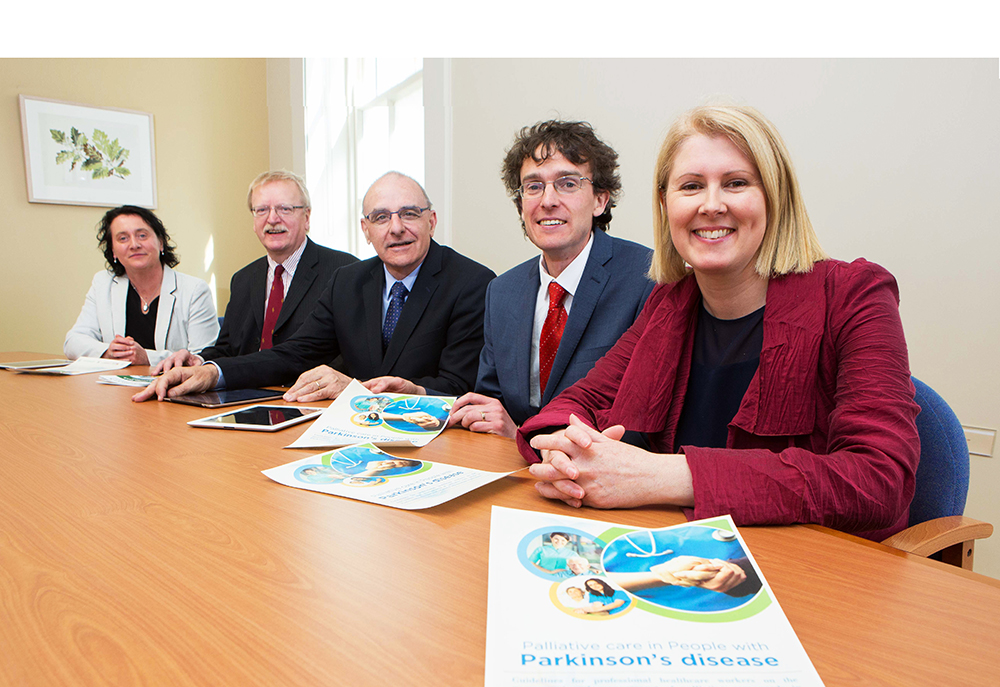
Launch of Palliative Care Guidelines
 Dr Suzanne Timmons (Guidelines Project Lead) and Dr Siobhan Fox (Project Co-ordinator)
Dr Suzanne Timmons (Guidelines Project Lead) and Dr Siobhan Fox (Project Co-ordinator)
Dr. Suzanne Timmons, Senior Lecturer, Centre for Gerontology and Rehabilitation, School of Medicine launched 'Guidelines on the assessment and management of the palliative care needs of Parkinson’s disease and Parkinsonian syndromes', in University College Cork’s College of Medicine and Health, on 26 April 2016, coinciding with World Parkinson' Awareness month.
Palliative Care Approach For Parkinson’s disease?
April is world Parkinson’s Awareness month, and approximately 12,000 people in Ireland are living with Parkinson’s disease. The guidelines, “Palliative care in People with Parkinson’s disease: Guidelines for professional healthcare workers on the assessment and management of palliative care needs in Parkinson’s disease and related Parkinsonian syndromes,” were assembled by an advisory group of national and international experts.
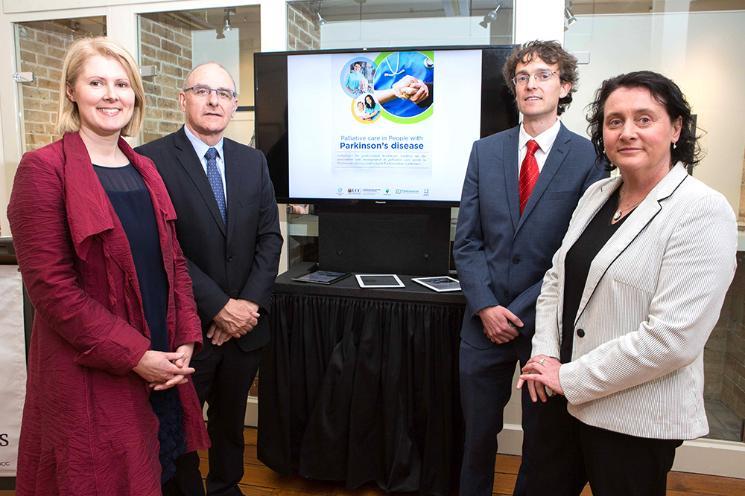 From left; Dr Suzanne Timmons, Consultant Geriatrician; Prof Tony O’Brien, Consultant Physician in Palliative Medicine; Dr Sean O’Sullivan, Consultant Neurologist; Paula Gilmore, CEO Parkinson’s Association.
From left; Dr Suzanne Timmons, Consultant Geriatrician; Prof Tony O’Brien, Consultant Physician in Palliative Medicine; Dr Sean O’Sullivan, Consultant Neurologist; Paula Gilmore, CEO Parkinson’s Association.
Parkinson’s disease is a progressive neurodegenerative condition resulting from the death of the dopamine producing brain cells, and is currently incurable. Those afflicted with Parkinson’s disease can benefit from a palliative care approach and/or Specialist Palliative Care input; yet traditionally, palliative care has been viewed as end-of-life care and associated with cancer or hospice care. Furthermore, many health care workers have been unsure of the appropriateness of palliative care in Parkinson’s disease, and a series of research studies conducted by UCC’s Centre for Gerontology and Rehabilitation indicated a need for healthcare workers to have better training and skills in palliative care for people with Parkinson’s disease. It is hoped that these guidelines will result in improved care for people with Parkinson’s disease and their families.
Dr. Suzanne Timmons, Senior Lecturer, Centre for Gerontology and Rehabilitation, School of Medicine, UCC comments that: “Many healthcare workers are involved in the care of a person with Parkinson’s disease, across primary, acute and long-term care settings. We have previously performed research which indicated that many healthcare workers in Ireland were aware of people with Parkinson’s disease having significant unmet palliative care needs. However, the healthcare workers reported little previous training in palliative care for Parkinson’s disease, and they were sometimes unsure of how and when to adopt a palliative care approach in Parkinson’s disease. Healthcare workers, and people with Parkinson’s disease along with their carers and families, have all indicated that formal guidelines would be an important step in improving healthcare workers’ awareness and practice of palliative care for Parkinson’s disease. The guidelines have been endorsed by, and will be made available electronically through, the HSE's National Clinical Programmes in Older Persons, Neurology and Palliative Care, which will facilitate healthcare workers' ready access to the guidelines."
 Speakers and attendees at the launch event in Jennings Gallery.
Speakers and attendees at the launch event in Jennings Gallery.
The Irish Hospice Foundation funded the research and development of these guidelines. Paula Gilmore, CEO Parkinson’s Association of Ireland stated that “On behalf of the Parkinson’s Association of Ireland we are delighted to see these guidelines being launched. Parkinson’s disease is a progressive neurological disorder. It is not currently curable and affects approximately 12,000 people in Ireland. This figure is expected to double over the next 20 years. As Parkinson's disease progresses and symptoms no longer respond well to treatment, daily living and quality of life become more difficult. People with Parkinson’s disease and their carers may need more help to manage their symptoms and physical requirements as well as their psychological and emotional needs. Palliative care should mean that people affected by Parkinson's and their carers have the best quality of life possible, and the launch of these guidelines will help healthcare workers to best meet the needs of people with Parkinson’s disease through a palliative care approach, or referral to specialist palliative care if necessary.”
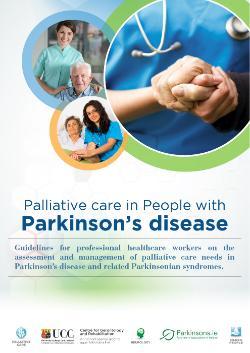 The guidelines can be downloaded from Palliativecare in People with Parkinsons disease (8,470kB)
The guidelines can be downloaded from Palliativecare in People with Parkinsons disease (8,470kB)
Biomarkers For Parkinson’s Disease – study update
AKT Activity in Parkinson’s disease – a research study investigating a potential biomarker in Parkinson’s disease.
Chief Investigator: Dr. Suzanne Timmons; Co-Investigator: Dr. Cora O’ Neill; MSc Student: Ms. Sandra Yeomans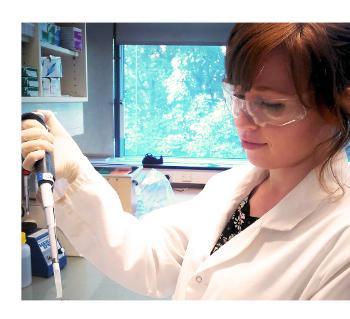
Study Aims
Understanding the pathogenesis of Parkinson’s disease is vital when it comes to the development of treatments which may prevent, cease or slow the disease progress in those affected. We know that inflammation plays a large role in Parkinson’s disease, and that a particular protein known as AKT/Protein Kinase B keeps cells alive during times of inflammation. AKT is shown to be activated by cell stress and has been implicated in many neurological diseases such as Alzheimer’s disease, Huntington’s disease, Schizophrenia and also in Parkinson’s disease. Studies performed in the laboratories of UCC have highlighted diminished levels of AKT in the brain in Parkinson’s disease, and it has been shown that biochemical abnormalities in the brain are mirrored in peripheral tissues such as blood cells and skin cells. We are thus studying AKT levels and activity in peripheral blood cells - lymphocytes, monocytes and macrophages- in people with Parkinson’s disease who are both on medication and yet to commence medication, and following their AKT levels over time and throughout medication changes.
Recruitment
People are recruited from the Movement Disorder clinics with the co-operation of the physician running the clinic. We have recruited people with Parkinson’s disease who are on treatment and also who have yet to commence treatment, about 20 in each group. A third healthy control group have also been recruited, often spouses / carers of those already in the study.
The story so far
As of September 2015, we have recruited almost all the required amount of people with Parkinson’s disease and healthy controls. The analysis of blood is underway and is showing useful results. We will be presenting the results at international conferences and in academic journals, to help spread the results to other doctors and scientists.
We will shortly begin to recruit patients with Parkinson’s disease and controls for the next phase, which involves looking at skin fibroblast cells, taking a tiny sample of skin from the inside of the forearm.
Gut Microbiota In Parkinson’s Disease
Gut Microbiota in Parkinson's Disease
Investigators: Dr. Suzanne Timmons; Dr. Cora O’ Neill; Prof. Paul O’Toole
We are continuing to recruit patients with Parkinson’s disease for an exciting study on gut microbiota. We all know that constipation is common in Parkinson’s disease, but we believe that Parkinson’s disease may alter the normal bowel flora (bacteria) so that certain “healthy” bacteria are lost and other strains overgrow. This may then be linked to inflammation in gut nerves, which relay to the brain, and the question is whether this then can trigger inflammation or other changes in brain cells. The link between the bowel and the brain may be very important in Parkinson’s disease – as an important source of toxin entry to the body, and because our bowels have a huge amount of bacteria.
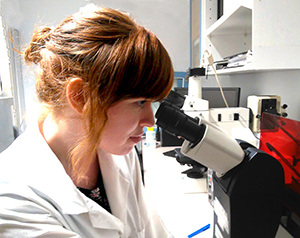 For this study, patients with Parkinson’s disease are giving a stool and urine sample, and a blood sample. We are particularly looking for people with Parkinson’s disease on medications already.
For this study, patients with Parkinson’s disease are giving a stool and urine sample, and a blood sample. We are particularly looking for people with Parkinson’s disease on medications already.
Are you interested in volunteering?
If you wish to be involved in any of these studies, or future studies, either as a Parkinson’s participant or as a healthy control please contact
Mr. Edmund Manning (Research Nurse) or Dr. Suzanne Timmons at (087) 2607974
or email us: edmund.manning@ucc.ie or s.timmons@ucc.ie.
For additional research into Gut Microbiota please see: http://eldermet.ucc.ie/

Research nurse Mr. Edmund Manning taking details from study volunteer.
Palliative care needs in Parkinson’s disease
Palliative care needs in Parkinson’s disease: an initiative to raise cultural awareness, educate healthcare workers and provide cohesive support to patients and their carers/families.
Principal investigator: Dr. Suzanne Timmons; Project coordinator: Dr. Siobhán Fox
Study aims:
The aim of this study is to raise awareness of symptoms in Parkinson's disease (PD) and to better support people with PD and their carers. As any person with PD knows, symptom management is very difficult. The palliative care approach which aims to improve the quality of life of patients and their families dealing with a life-limiting illness (pain, symptom control) is ideally suited to the management of PD.
Progress to date:
Since commencing in October 2013, three independent research studies have been completed. This involved exploring perceptions of palliative care need in people with PD, from a number of perspectives. In the first study a national survey of Health Care Workers (HCWs) was carried out, and the second study explored these results in further detail using in-depth interviews with HCWs. The third study consisted of interviews with people with PD, and their families/carers.
We have also developed Irish National Guidelines for the palliative care of people with PD, to provide practical guidance for HCWs on the assessment and management of palliative care needs in Parkinson’s disease, and to improve care for these people and their families. These guidelines will be officially launched in early 2016.
Recent publications from this research:
Fox, S., Gannon, E. Cashel, A., Kernohan, W.G., Lynch, M., McGlade, C., O’Brien, T., O’Sullivan, S., Sweeney, C., & Timmons, S. (2015). Survey of healthcare workers suggests unmet palliative care needs in Parkinson’s disease. Movement Disorders: Clinical Practice, 2(2), DOI: 10.1002/mdc3.12133
Collaborators:
Dr. Sean O’Sullivan, Consultant Neurologist, CUH & Senior Lecturer, UCC Prof. George Kernohan, Professor of HealthResearch, University of Ulster. Ms. Alison Cashel, Parkinson’s Disease Nurse, Parkinson’s Association of Ireland. Ms. Marie Lynch, Programme Development Manager, Irish Hospice Foundation. Dr. Ciara McGlade, Consultant in Geriatric Medicine, MRH. Dr. Tony O’Brien, Consultant in Palliative Medicine, Marymount Hospice.
News updates 2015:
Dr Siobhán Fox was invited to present and discuss her research in Denver Colorado at the “Palliative Care in Parkinson’s Disease Conference”, which was hosted by the Department of Neurology, University of Colorado School of Medicine. The conference took place from 3rd-4th October 2015.
 Dr Fox also recently presented her research at the Marymount International Conference. Two posters were presented, titled: "The Process of Developing Irish Guidelines for Palliative care in people with Parkinson's disease and related Parkinsonian Syndromes" and "Exploring the palliative care and support needs of people with Parkinson's disease and their carers"
Dr Fox also recently presented her research at the Marymount International Conference. Two posters were presented, titled: "The Process of Developing Irish Guidelines for Palliative care in people with Parkinson's disease and related Parkinsonian Syndromes" and "Exploring the palliative care and support needs of people with Parkinson's disease and their carers"
At The International Association of Gerontology and Geriatrics European Region (IAGG-ER) 8th Congress, 23rd-26th April, Dublin. Dr Fox presented a paper titled ‘A Multi-Method Exploration of Palliative Care Needs in Parkinson’s disease in Ireland:Healthcare Workers, Patients, and Family Perspectives’ and discussed the findings from the palliative care in Parkinson’s disease study.
“What are the views of people with PD and their families/carers about palliative care?” was the title of the paper presented by Dr Siobhán Fox at the 14th Annual Kaleidoscope International Palliative Care Conference held 13th-14th May 2015, in Dublin Castle. The conference theme was “Palliative Care Beyond Cancer”.
RESEARCH UPDATES
Biomarkers in Parkinson’s disease
Grace Crotty
Department of Medicine
published in The BooleanSnapshots of Doctoral Research at University College Cork
Introduction
Do you know anyone who has been diagnosed with Parkinson’s disease? What is Parkinson’s disease? In the Department of Medicine in UCC I am carrying out research on this condition, and I’m working with people who have Parkinson’s disease (PD). I hope to increase our understanding of the disease mechanisms underlying PD along with identifying potential biomarkers for PD. What are biomarkers? Why do we need a biomarker? Keep on reading to discover more!
What is Parkinson’s disease?
It is the second most common age-related neurodegenerative condition after Alzheimer’s disease. It affects 1% of people over 65 years and 4% over 80 years. 30 million people are currently affected worldwide. It was first described by Dr. James Parkinson in 1817 in his book “An Essay on the shaking palsy”. Parkinson’s disease occurs when there is not enough of a chemical called dopamine being produced by your brain. People with PD classically present to their doctor with one of its cardinal motor features of resting tremor, slowness of movement or trouble with walking. However, other non-motor symptoms may also be present in addition to these motor features. These non-motor symptoms include difficulties with sleep, memory and mood along with dysfunction of the gastrointestinal, cardiovascular and autonomic nervous system. Interestingly, these non-motor symptoms, although quite nonspecific, may affect the patient before the onset of motor symptoms.
How do you diagnose Parkinson’s disease?
Parkinson’s disease is currently diagnosed by a doctor following the development of motor symptoms consistent with PD. We have no blood test or brain imaging technique that can diagnose PD before a significant amount of brain degeneration has already taken place. Therefore there can be a misdiagnosis of PD in 10-30% of cases, particularly in the earliest stages of the condition. In some cases it can be difficult to know for sure that a person with a tremor definitely has PD rather than another neurological condition. We can only be 100% sure of the diagnosis of PD on post-mortem brain biopsy where we can see loss of the nerve cells producing a chemical messenger called dopamine, along with the presence of “Lewy bodies” which are structures containing deposits of a protein called alpha-synuclein.
Of note, PD can be present in a patient up to decades before the motor symptoms start. However, by the time a patient with PD develops these symptoms, more than 80% of the dopamine in their brain is gone. We currently have not identified any marker in the blood or spinal fluid to help us with diagnosing PD at a very early stage prior to the onset of symptoms. Research is ongoing to find a biomarker to do this.
What is a biomarker?
A biomarker is a parameter or an indicator of a particular disease state or a particular state of an organism. Biomarkers can be found anywhere in the body. They can be broadly classified into molecular biomarkers or imaging biomarkers. Whatever form the biomarker takes it should be simple, validated, inexpensive, as well as highly sensitive and specific for its particular condition.
Why do we need a biomarker?
Biomarkers are very important and useful for a variety of reasons. They can help with the early diagnosis of a condition, along with confirmation of diagnosis, population screening, drug development, monitoring of disease progression and of patients’ responses to treatment. For people with PD a biomarker would be particularly helpful for identifying PD at an earlier stage in the disease process before the destruction of the nerves that produce dopamine in the brain. It would also increase our understanding of the underlying mechanisms of the disease and aid the development of neuroprotective strategies that could slow down or stop the disease process.
Biomarkers in PD
Our research group in University College Cork, along with several other research centres around the world, is currently searching for potential biomarkers for PD. The Michael J Fox foundation (www.michaeljfox.org) has also provided copious amounts of information and funding for research on PD. Biomarkers that have been studied can be subdivided into those that are preclinical, premotor, biochemical, genetic and imaging.
Link to full article at : The Boolean Snapshots of Doctoral Research at University College Cork
RESEARCH UPDATE from Parkinson's Disease Research Cluster
Novel Biomarker Development gathering Momentum
We are delighted to say that our work in developing novel biomarkers in PD is gathering momentum, and early results are very promising. Dr. Sean O’Sullivan and Dr. Grace Crotty from Cork University Hospital will be presenting some of the results at both the 50th meeting of the Irish Neurological Association in Belfast, May 8-9th 2014 and the International Parkinson and Movement Disorder Society 18th international congress of Parkinson's disease and movement disorders in Stockholm, June 8-12th 2014. We will be presenting on 4 studies of relevance, including provisional data on studies investigating nonmotor symptoms, autonomic dysfunction, pain perception and temperature sensation in people with Parkinson’s disease compared to controls along with an audit on the use of DaTscan in diagnosing Parkinson’s disease. Dr O’Sullivan will chair and present at a teaching course “Addiction and withdrawal of dopamine replacement therapy for Parkinson’s disease”.
Nonmotor Symptoms, automonic dysfunction and pain study
We have found that nonmotor symptoms, autonomic dysfunction and pain are more common in people with PD compared to controls. Pain is often experienced prior to or at the time of diagnosis with PD. In general, these symptoms are often unrecognized by clinicians and patients and are therefore not asked about in consultations. However, they have a significant impact on quality of life and need to be acknowledged and managed appropriately.
Sensory Testing Study results
We will also present results on sensory testing in both people with Parkinson’s disease and controls. We carried out this testing in order to detect for differences in the ability to detect hot and cold temperature along with pain. We found a difference between people with PD compared to controls in regards to recognizing when a thermal probe was becoming hot or cold in temperature. Further analysis of results is ongoing.
DaTscan altering Clinical Management of patients
Lastly, we will present data on DaTscan use in Cork University Hospital. Provisional results show that DaTscan altered clinical management in one third of patients, in terms of making a diagnosis or commencing medications in people with PD.
Blood and Spinal fluid Biomarker study
Other ongoing studies in Cork include studies on potential biomarkers in the blood or spinal fluid. We have already collected samples on both controls and people with PD. We are looking at proteins in the blood or spinal fluid that may help identify PD at an earlier stage. Participants in this study will have a blood test along with a lumbar puncture carried out in the hospital over an hour with discharge home later the same day. We have received a lot of interest in this study and are particularly interested in provisional results.
Interested in learning more or taking part? Contact Us
If interested in learning more or taking part in one of our studies, please contact us by email at pdreasearch@ucc .ie or call us at 085-814-9380.
